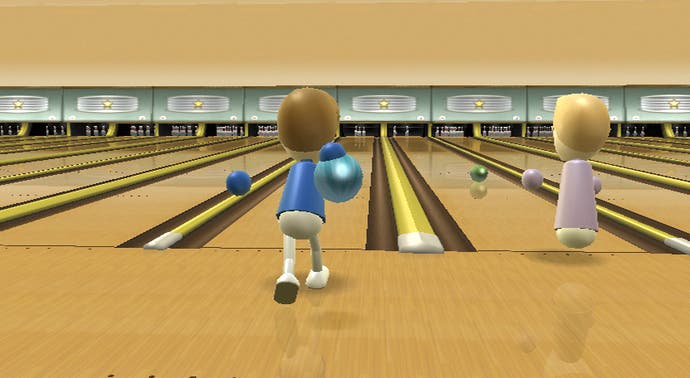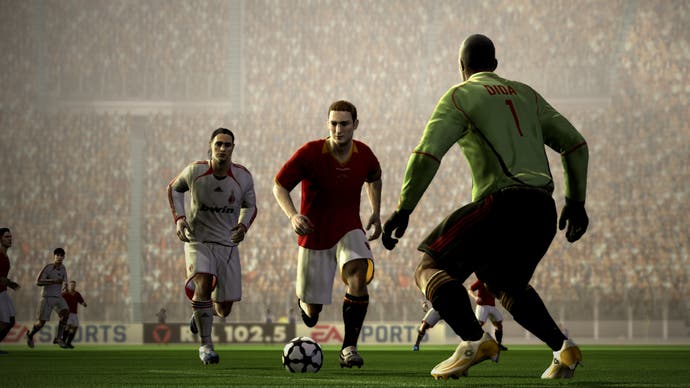The Casuals Are Coming!
Leave those kids alone.
When you look ahead to the future of gaming, what do you see? An ever-expanding electronic frontier, where games become more varied and immersive as technological boundaries are broken? An infantile playground for the undiscerning masses, dominated by repetitive tasks involving colourful blocks?
If you took the first option then congratulations - you have yet to fall victim to the creeping menace of casual-phobia, a silly and baseless fear that seems to have taken hold of certain vocal corners of the gaming community ever since the Wii merrily danced its way into the number one console spot with a insouciant waggle of its magic wand. "Casual gamers!" goes the paranoid cry. "They're ruining gaming! Nobody will make proper games for us if they can make millions from mini-game compilations!" Whining babies, the lot of them.
As with any perceived fad, "casual" has somehow become a buzzword wantonly misused by both gamers and executives alike, as if it represents some new, mysterious evolutionary avenue for our beloved hobby. As anyone with a sensible grasp of gaming history can tell you, this is nonsense.
Even the term itself is loaded with semantic confusion. How do you actually define a "casual" gamer? I play the bloody things for a living so, as far as I'm concerned, most of the people reading this will be casual gamers by default. Is it someone who just plays games for fun? And, if so, isn't that what games are supposed to be for? Maybe it's the gamer that plays games for a certain kind of fun - just a commitment-free quick-fix of electronic amusement, something to be fitted in between other real life pursuits? When you look at it like that, isn't it what we've all done at some time or another?

And where then does that leave the "hardcore" gamer, the self-identified and adolescently-titled polar opposite of the dreaded casual? Are they expected to spend hour upon hour doggedly dedicating themselves to games as if there's some prize for taking playtime too seriously? However you try to define it, casual gaming becomes that most ephemeral of things - a phenomena that nobody can exactly agree on, but everyone is sure they know it when they see it. Whatever its nature, it's here, it's growing and it's spoiling our industry. Right?
Wrong, and it's here that the real problem with the whole casual/hardcore dichotomy really lies. Casual gamers are not invaders or interlopers, encroaching on hallowed gaming soil with their shallow interests and gimmicky controllers and silly party games. Casual gamers - and you may want to sit down for this bit - were here first. Take, for example, an infamous mini-game compilation based on a top-rated soap opera. Typical casual gaming shovelware, right? Don't go looking for it in the upcoming Wii releases section though. It's Eastenders: The Computer Game. And it came out twenty years ago on the ZX Spectrum.
When you look at the broad span of gaming history it's the self-proclaimed hardcore that stand out as a cultural anomaly, a mutation in the gaming DNA that really only began in the last decade or so as games were able to become more complex in both structure and narrative. Yet so vocal and so lucrative has this demographic become in recent years that the common perception is that the gaming landscape was designed with these hardcore players in mind. Developers, publishers and console manufacturers are all forced to make reassuring noises, promising that their latest products won't alienate or abandon the poor faithful hardcore gamer, while they all secretly hope that they've made something appealing enough to attract big bulging sacks of lovely, casual money.

This vision of twin industries in constant opposition is an illusion, however; a faulty perception created by internet chatter, PR spin and the willingness of the media to label a bandwagon and ride it into the ground with no remorse. I've reluctantly been guilty of it myself, using the phrases "casual" and "hardcore" in reviews despite my fundamental dislike of them, because for better or worse they've become an effective form of shorthand for games discussion.
Yet journey back in time to the dawn of gaming, when the first Space Invaders descended relentlessly into the public consciousness and, outside of a small cabal of high-score junkies, there was no such thing as "hardcore" gaming. Even as the Atari 2600 began the process of moving gaming from the arcade to the living room, it was still something people did for fun, even though the games in question were far tougher than the hardest of today's hardcore titles.

